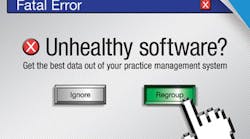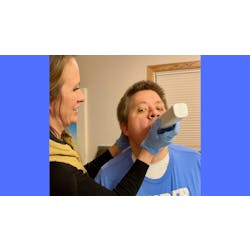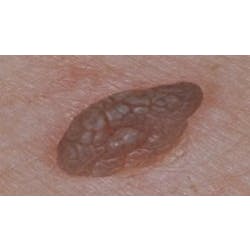By Eileen Morrissey, RDH, MS
One of the best ways to get patients to do what you want them to do is to tell them what you do! This means being a role model and talking to them. Easy, right? It took me years to figure this out.
Take tooth brushing, for example. There are countless numbers of patients who sit in our chairs and present us with oral hygiene conditions that need improvement. They subscribe to the old adage, “Brush your teeth twice a day.” But many of them still skip the evening brushing. Since there is no ancient wisdom being generated about how long to brush teeth, most people go on automatic pilot and spend far less than the minimum two minutes. (I realize many dental hygienists teach effective duration, but I’m referring to the outside sources where folks acquire their general information.)
I noticed quite by accident that when I remarked to a few patients that I brush my teeth four times a day, they looked at me in sheer amazement. This was an absolute eye-opener for them. They were astounded. It was as if the thought had never occurred to them. Why? Because brushing once or twice a day was what they were always told, and therefore, what they always did.
My patients were fascinated and wanted to hear more. “Details, please, Eileen.” “Well, I brush them after I drink my morning coffee and eat my breakfast. I brush them after lunch before I return to my patients, or students if I’m at school. I generally get in a brushing sometime late in the day, depending on my social plans. And I always brush before I go to bed.” (Note: These are patients whom I have spoken with about how to improve the health of their mouths.)
I tell them I have been known to brush while driving, because a sink and water are not necessary. I either swallow my toothpaste, because I’m using only a minuscule amount, or I don’t use toothpaste at all.
By now, their eyes have widened and they appear close to fainting. And many of these patients actually go back to their worlds and change the rules they’ve lived by, all because I told them what I did. I find it’s more effective than telling them this is what they should do, because sometimes folks just don’t like to be told what they should do. They aren’t listening. They’re thinking about what they have to buy at the store on their way home, or about what to make for dinner.
I tell them about the mini-flossers I keep in my car so that I can floss with one hand while I’m driving, hence making productive use of my time. And I tell them how I have to keep Soft-Picks in my pocketbook, and visit the restroom immediately after dining out so that I can remove the food particles from between my teeth, thanks to the new areas of interproximal recession that are occurring as the years go by. I tell them how I formerly brushed my tongue with my toothbrush, but that it just didn’t seem to be getting the job done. I told them I was forever worrying about my breath, and seeing a coated tongue peering back at me from the mirror made me realize I had to scrape.
By now, their eyes have widened and they appear close to fainting. And many of these patients actually go back to their worlds and change the rules they’ve lived by, all because I told them what I did.
I tell them that while it’s not always practical for me to brush my teeth after drinking tea or wine, there is usually water nearby so that I can, at the very least, swoosh water in my mouth. I found out the hard way that any residue left on my teeth had the potential to turn into something undesirable that would show up at my cleaning appointments.
I relay to them how each of these things has made a difference in my mouth. It becomes a conversation, not a lecture, and the patient is my captive audience. Amazingly enough, many of these patients come in six months later and tell me, “Eileen, I started doing what you said you do, and I can’t wait to see if it made a difference!”
Yes, it has usually made a difference. This doesn’t work for everyone, but I’ll take what I can get. It’s nice to not always be preaching. Onward we go; it is in our hearts’ core! RDH
EILEEN MORRISSEY, RDH, MS, is a practicing clinician, speaker, and writer. She is an adjunct dental hygiene faculty member at Rowan College at Burlington County. Eileen offers CE forums to doctors, hygienists, and their teams. Reach her at [email protected] or 609-259-8008. Visit her website at www.eileenmorrissey.com.





